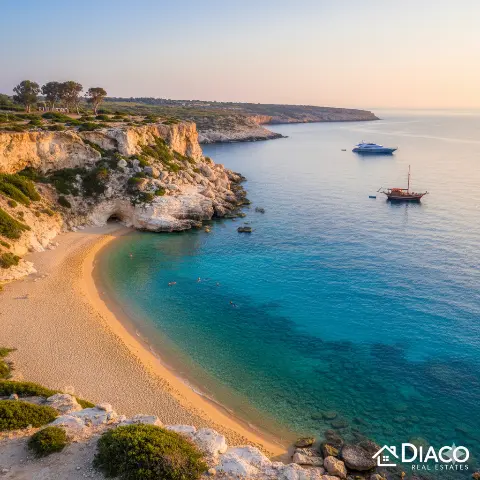(Section 1 of 5) Introduction: Making Your Cyprus Dream a Reality
The idea of owning a home in Cyprus—a villa with a sea view or a charming house in a traditional village—is a powerful dream. But for many, the process of buying property in a foreign country can seem intimidating. The good news is that Cyprus has a very well-defined, secure, and transparent legal framework for property acquisition, designed to protect the buyer. This guide will break down the process into clear, manageable steps, showing you how to navigate the journey from initial dream to holding the final Title Deeds in your hand. Understanding these steps demystifies the process and empowers you to make your purchase with confidence.
(Section 2 of 5) Step 1: Defining Your Goals and Finding Your Partner
Before you even look at a single property, the most important step is to define your objective. Are you looking for a holiday home that can generate rental income? A permanent residence for relocation or retirement? Or a pure investment property? Your goal will determine the ideal location, property type, and budget.
Once you have clarity, your next step is to select a licensed and reputable real estate agent. This is your most crucial partner. A good agent, especially one with deep local knowledge of their district—be it Paphos, Limassol, or the Famagusta area—provides more than just listings. They offer invaluable advice on area specifics, fair market value, and negotiation. They act as your guide on the ground, saving you time and preventing potential pitfalls. This partnership is the foundation of a successful purchase.
(Section 3 of 5) Step 2: The Search, Offer, and Reservation Agreement
This is the exciting part. Your agent will present properties that match your criteria for you to view. Once you find the one, you will make a formal offer. If your offer is accepted by the seller, the process is formalized through a Reservation Agreement.
This is a preliminary contract that outlines the basic terms of the sale. To make it official, you, the buyer, will pay a reservation deposit, typically ranging from €5,000 to €10,000. This is a sign of your firm commitment and has two key functions: it ensures the seller takes the property off the market and freezes the agreed-upon price. This deposit is held by the agent or lawyer in a client account and will form part of the final purchase price.
(Section 4 of 5) Step 3: The Legal Process and Due Diligence
With the property reserved, the legal mechanics begin. It is absolutely essential to engage an independent lawyer who specializes in property law. Do not use the developer's or seller's lawyer. Your lawyer works only for you.
Their primary job is to conduct "due diligence." This is a thorough investigation to ensure the property is a clean investment. They will check:
-
The Title Deeds: Confirming the seller has the legal right to sell the property.
-
Permits: Ensuring all planning and building permissions are in order.
-
Mortgages or Liens: Checking if the property has any existing financial claims against it.
Once your lawyer is satisfied, they will draft the main Contract of Sale. You will review and sign this, and it will then be officially stamped at the Tax Office. Your lawyer will then lodge the contract at the District Land Registry Office. This is a critical step called "Specific Performance," as it officially registers your claim on the property and prevents the seller from selling it to anyone else.
(Section 5 of 5) Step 4: Completion, Taxes, and Receiving Your Title Deeds
The Contract of Sale will specify the payment schedule. Once the final payment is made, the process of transferring ownership is completed. As a non-EU citizen, your lawyer will have applied for permission to buy from the Council of Ministers, which is now largely a formality.
There are two main taxes to be aware of:
-
VAT (Value Added Tax): This applies only to new properties. The standard rate is 19%, but a reduced rate of 5% may apply for a primary residence under certain conditions.
-
Property Transfer Fees: These are paid to the Land Registry for the transfer of the Title Deeds into your name. The fees are based on the property's market value and are on a sliding scale. Often, these fees are waived or reduced for properties subject to VAT.
The final, triumphant step is the issuance of the Title Deeds in your name. This is the ultimate proof of ownership, registered with the Cypriot government. While this can sometimes take time, your ownership is legally protected from the moment your Contract of Sale is lodged at the Land Registry.
Conclusion:
While the process of buying property in Cyprus involves several detailed steps, each one is designed to ensure a secure, transparent, and legally sound transaction. From finding a trusted agent like Diaco Real Estates to guide you, to having an independent lawyer conduct due diligence, the system is built on checks and balances that protect your investment. By following this path, your dream of owning a home in the sun becomes a safe and rewarding reality.
